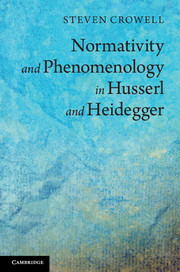Book contents
- Frontmatter
- Contents
- Acknowledgments
- Citation conventions for the works of Husserl and Heidegger
- Introduction
- Part I Transcendental philosophy, phenomenology, and normativity
- 1 Making meaning thematic
- 2 Husserlian phenomenology
- 3 The matter and method of philosophy
- Part II Husserl on consciousness and intentionality
- Part III Heidegger, care, and reason
- Part IV Phenomenology and practical philosophy
- References
- Index
2 - Husserlian phenomenology
Published online by Cambridge University Press: 05 April 2013
- Frontmatter
- Contents
- Acknowledgments
- Citation conventions for the works of Husserl and Heidegger
- Introduction
- Part I Transcendental philosophy, phenomenology, and normativity
- 1 Making meaning thematic
- 2 Husserlian phenomenology
- 3 The matter and method of philosophy
- Part II Husserl on consciousness and intentionality
- Part III Heidegger, care, and reason
- Part IV Phenomenology and practical philosophy
- References
- Index
Summary
Phenomenology and twentieth-century thought
Though the term “phenomenology” was in use prior to Edmund Husserl – it is found, for instance, in Kant and Lambert, and, with a very different signification, in Hegel – it is in its Husserlian form that phenomenology came to exert a decisive influence on twentieth-century thought. To understand Husserlian phenomenology it is pointless to go back to the term’s previous uses, since Husserl paid no attention to these; instead, his thinking developed in debates over the foundations of arithmetic and logic carried out in the school of the Austrian philosopher Franz Brentano. Nor is Husserlian phenomenology a static entity. Initially a method for tackling certain epistemological problems, phenomenology became, over the four decades of Husserl’s mature philosophical life, the basis for a complete “system” that “has within its purview all questions that can be put to man in the concrete, including all so-called metaphysical questions, to the extent that they have any possible meaning at all” (Hua 5, p. 141/Husserl 1989, p. 408). So understood, phenomenology was to be a platform for generations of researchers who would contribute, as in the natural sciences, to a growing stock of philosophical knowledge. In so doing they would shore up the threatened legacy of European civilization – a culture based not on tradition and opinion, but on rational insight into universally valid truths and values.
The fate of Husserlian phenomenology in the twentieth century turned out quite differently, however. Husserl’s project did provide the starting point for several generations of philosophers, beginning with contemporaries such as Alexander Pfänder, Adolf Reinach, and Moritz Geiger, and continuing through Martin Heidegger, Jean-Paul Sartre, Maurice Merleau-Ponty, Emmanuel Levinas, Hans-Georg Gadamer, and Jacques Derrida, among many others. Yet in each case adoption of the phenomenological approach was accompanied by rejection of much of Husserl’s actual doctrine. As a result, though phenomenology remains a vital contemporary movement, Husserlian phenomenology is often treated as a mere historical antecedent.
- Type
- Chapter
- Information
- Normativity and Phenomenology in Husserl and Heidegger , pp. 31 - 57Publisher: Cambridge University PressPrint publication year: 2013



